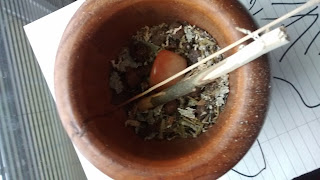My journey with Inanna began about six months ago when I had a dream in which a figure radiating a spectrum of colors around them came to me. The colors reminded me of a rainbow reflected in a pool, appearing in patterns resembling the leaves of a lotus flower. In between that lucid state between passed-the-frell-out and semi-conscious, I asked "Who are you?"
She answered, "Inanna."
During the next month I researched when I could in between the endless cycle of sleep and work what ever I could get my hands on about this ancient sumerian goddess. And what I found completely took me a a back.
(the following descriptions of her myth cycle come from The Descent of Ishtar: both the Sumerian and Akkadian Versions and it's translations of the original sources, as well as the retelling of the myths in Inanna, Queen of Heaven and Earth: Her Hymns and Stories from Sumer. I highly recommend both, especially source #2 since the folklorist Diane Wolkstein is one of the writers.)
Inanna is a goddess of the sky and a war goddess who empowers her own seat of worship and civilization by stealing the magical codes of civilization called the Mes from Enki. Her character is basically summed up in so many words: "The kingdom of heaven and earth is mine for the taking."
So she establishes her city and has everything a goddess could want, A virile husband, two sons (I'm convinced in my own UPG she has way more children than this), and six other cities devoted to her in time. The glimmering evening star really is queen in every sense of the word. She is brash and vengeful to anyone who harms and challenges her. Once, she utterly RUINED a man who raped her. (it was so good to see no rape apologies in this sex goddess' mythos).
After reading this interpretation of the myth of Huppulu tree from matrifocus.com (the domain has expired on it, otherwise I would link to it), I realized that it maybe her ascent to power came at a great cost.
(in the orignal myth of the tree, please note it's recorded that Inanna wanted it to grow so she could make her throne out of it, so the following is very UPG centered)
She cut down her beloved tree to turn it into her throne (an icon of fertility that is fitting, i.e. the queen of heaven sitting on a fine piece of wood representing the earth - oops, accidental sexual innuendo). This resonated with the message of The Giving Tree, and it was an angle and question I continued to ask through out my studies of her (still on going): What price does one pay to be queen?
I found in this myth the undertones of a woman who abandoned much of what she might have valued about herself as a child to attain a bit of her own freedom and power among the retinue of the sumerian gods. In the Hupullu tree myth, Littu, Anzu, and a serpent plagued the tree and she could not harvest it until Gilgamesh drove them out. Anzu is a mythical monster bird that causes quite a bit of trouble for the Annunaki later on. Littu is a female demon of sorts that scholars speculate later became pre-Genesis Lilith and the serpent far as I know is just a serpent who is said "would not be charmed" (the satan serpent of Genesis, maybe?).
It was hard not to picture a young girl who had to sacrifice so much of who she was as a woman wandering on the banks of the Euphrates: a wild nature, a child like sense of freedom who perhaps naively assumed that power is the only end goal. This nature could be symbolized by the concept of the serpent as a little kid's animal friend and Littu perhaps as what the other Annunaki would have viewed as a "lesser" self and wouldn't have tolerated once she ascended the throne.
So I couldn't help but wonder, what happened to Littu and the serpent after they were cast out of her tree? Littu fled to "wild places" and the serpent was struck (struck dead? the poem's wording is uncertain). If you think of serpents as emblems of rebirth, you know that this serpent's fate is far from meeting it's end. To me, it seems as though these were pieces of her divine nature she bargained off and cast to the Underworld in order to become queen.
(in the orignal myth of the tree, please note it's recorded that Inanna wanted it to grow so she could make her throne out of it, so the following is very UPG centered)
She cut down her beloved tree to turn it into her throne (an icon of fertility that is fitting, i.e. the queen of heaven sitting on a fine piece of wood representing the earth - oops, accidental sexual innuendo). This resonated with the message of The Giving Tree, and it was an angle and question I continued to ask through out my studies of her (still on going): What price does one pay to be queen?
I found in this myth the undertones of a woman who abandoned much of what she might have valued about herself as a child to attain a bit of her own freedom and power among the retinue of the sumerian gods. In the Hupullu tree myth, Littu, Anzu, and a serpent plagued the tree and she could not harvest it until Gilgamesh drove them out. Anzu is a mythical monster bird that causes quite a bit of trouble for the Annunaki later on. Littu is a female demon of sorts that scholars speculate later became pre-Genesis Lilith and the serpent far as I know is just a serpent who is said "would not be charmed" (the satan serpent of Genesis, maybe?).
It was hard not to picture a young girl who had to sacrifice so much of who she was as a woman wandering on the banks of the Euphrates: a wild nature, a child like sense of freedom who perhaps naively assumed that power is the only end goal. This nature could be symbolized by the concept of the serpent as a little kid's animal friend and Littu perhaps as what the other Annunaki would have viewed as a "lesser" self and wouldn't have tolerated once she ascended the throne.
So I couldn't help but wonder, what happened to Littu and the serpent after they were cast out of her tree? Littu fled to "wild places" and the serpent was struck (struck dead? the poem's wording is uncertain). If you think of serpents as emblems of rebirth, you know that this serpent's fate is far from meeting it's end. To me, it seems as though these were pieces of her divine nature she bargained off and cast to the Underworld in order to become queen.
Her iconography prior to her descent myth cycle is one of an incomplete, unrealized self. She cuts down the huppulu tree and sits on her throne in Erech, so in that moment, she is queen of heaven and earth.
But what about hell (hell in the dark, ghost ridden, drafting, mud logged underworld sense)?
But what about hell (hell in the dark, ghost ridden, drafting, mud logged underworld sense)?
Here comes the part (UPG heavy) I resonate with wholly as a non-binary pagan searching for a way to reclaim their queer body: When Inanna goes to the underworld to console her sister Ereshkigal after her husband's death, she is forced to appear before her naked, is subsequently killed, and hung on a hook, left to rot in the dark of hell. Seems extreme, eh? The result of a jealous, broken sister's hate for her sibling who gets all the earth's love in the light of day? Yes, the dichotomy of unloved, underworld deity vs. beloved over world god is rather obvious, but what I took away from this is that a transformation took place. Dare I say it, a transition of sort was about to unfold,in order to make Inanna whole again from where she severed herself from the girl she used to be when her huppulu tree fell to make her throne.
In the underworld and spiritual journeys therein, one is at times taken apart, sometimes violently, and put back together again. It is usually a painful psychological process and I would not recommend it to someone who has any reservations/hesitations about it. Often we need this sort of trans-formative healing when we are broken, but I would feel irresponsible if I advised it as the only mode of healing, or one that should be taken lightly, when there are other methods for healing that are less emotionally risky or draining.
Inanna is left in the underworld to rot for a few days on her hook before her devoted servant enlists the help of Enki to bring her body back to life. Ereshkigal ends up getting something she wants in the bargain and so Inannna returns, fully realized as queen of Heaven, Earth, and the Underworld - a trifecta of sorts I think was necessary in her role as fertility goddess. And none of that sweet mother goddess stuff here - she would spit you out and kill your mom just as soon as you cursed her name.
Long story short, she banishes her husband for claiming the throne in her brief absence (without searching for her) for a portion of the year. It is the most dysfunctional hieros gamos I have ever come across and it is the wonderful boot in the gut for Inanna to deliver to the world - a way of saying, yeah, I'm the mother frelling QUEEN.
So what does all this mean for a queer friendly space with Inanna and Ereshkigal?
- Ereshkigal is an annunaki of violent transformations, and for me, transitioning has been an earth shattering, painful experience (I know who I am, but stressing that to others and the human world around me has been a living hell). Ereshkigal has held the hook by which I have actually willingly let myself be strung on in order to let the old me die so a new, resilient body can rise. She is often a goddess who can help you initiate what you are unable to do for yourself alone.
It's my UPG that Ereshkigal knew death was necessary for the cycles of heaven and the underworld to align. The foundation for spiritual rebirth is possible through the sky herself dying and quickening again.
Inanna's aspects (the serpent and Littu) of the Huppulu tree were banished by a young woman not even fully aware of the struggle that ensues in descending into hell to reclaim the pieces of oneself -those things you leave behind for the sake of orbiting in "civilized"circles.
Praise be to Innanna, Queen of Heaven, Earth, and the Underworld
Praise be to Ereshkigal, primary Queen of the Underworld
May my transitive spirit be reborn beneath your sky and within your glorious, dark earth.













